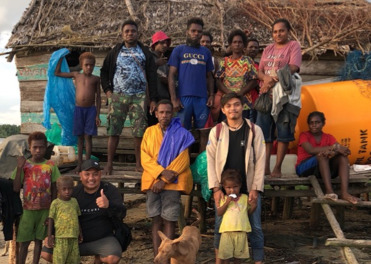
Norce Mote S.Si., M.Si. was born in Yapen Waropen, on 7 November 1983. Norce, as she is generally known, is a mother of three who is devoted to two things: Family and nature conservation. Since childhood, she has aspired to become a teacher. However, this dream was put to one side when she followed her husband, who worked as a government employee, to Merauke in Papua. Fortunately, even though she had to move, her husband continued to encourage her that one day she would be able to pursue her dream.
In 2009, Norce made an attempt to revive her love for education. She enlisted as a young lecturer at the Water Resources Management Study Programme in the Faculty of Agriculture at Musamus University Merauke (UNMUS). Even at this early stage, Norce felt she had knowledge to share by becoming a lecturer. In the same year, she had the opportunity to do an internship at the Bogor Agricultural Institute, majoring in Marine Resource Management in the Faculty of Fisheries and Marine Sciences; she studied the management of the macro bio lab and developed her technical understanding of fisheries through various field activities. She then pursued a Master’s degree at the Bogor Agricultural Institute, majoring in Water Resource Management in the Faculty of Fisheries and Marine Sciences.
Norce figures prominently in the world of academia. In just two years and four months, she has jumped from being an expert assistant to a lecturer and was named the best young researcher in Papua. As a lecturer at Musamus University in Merauke, Norce was also asked to be the Head of the Laboratory, with a focus on field practicum activities. Despite her busy schedule of education and ocean activities, this mother of three always finds time at the weekends to enjoy nature with her family.
Norce is currently preparing for her doctorate at Hasanuddin University Makassar, through a scholarship from the Education Fund Management Institute (LPDP).
Read also: Jabulenga: The Center of Shrimp Fisheries in the Aru Islands
Ensuring Sustainable Fisheries
In her capacity as lecturer at Musamus University, Norce is known for her track record in assembling members of the Working Group (Pokja) on the Zoning Plan for the Kolepom Island Conservation Area in Mearuke Regency, Papua; and field biology studies related to fisheries in the Kolepom Island Conservation Area. Norce’s life never takes her far from the world of education and fisheries, and she has a dream to create an EAFM Learning Centre in Papua. According to her, this initiation must be realised; the ecosystem of the southern region of Papua is very wide and diverse compared to neighbouring areas, so good and sustainable fisheries management is sorely needed. In the future, the EAFM Learning Centre can become a place of learning and provide certification for students and the community.

As she puts it: “Life is not about who is the best, but who wants to do good.” This principle is something that Norce holds onto in her everyday life. It underlies every scientific publication and applies to all research she undertakes, whether helping other people or the environment. This principle also encouraged her to get involved in the implementation of an Ecosystem Approach to Fisheries Management (EAFM). From 14-18 June 2021, Norce was involved in the Essential Ecosystem Approach to Fisheries Management (E-EAFM) training session organised by the GEF/UNDP/PEMSEA ATSEA-2 Programme at the Swiss-Bel Resort in Watu Jimbar, Sanur, Bali. During the training, Norce, together with representatives from Papua New Guinea and Timor-Leste, shared her thoughts and ideas to develop an EAFM implementation plan for red snapper.
“In the past, fisheries management used a species approach, but we forgot that species also depend on the habitat/ecosystem and governance in terms of the socio-economic aspects of the community, because people take advantage of these species. For sustainability, fish resources are currently very important in the practice/concept of EAFM that is used,” said Norce Mote.
In her opinion, the E-EAFM training was invaluable in developing good and sustainable fisheries management based on three components: Ecology, human welfare and good governance. In addition, she hopes that in the future the EAFM concept can be expanded to include the management of Barramundi (Lates calcalifer)/white snapper (Macolor niger), Chinese snapper (Jhonius australis) and shrimp or other species, especially those in Arafura waters, so they remain sustainable and long-lasting for years to come.
Read also: Supporting Artisanal Fishery Development in Papua New Guinea
(Johanis Valentino Fofied)


